Craig Williams
BBC Scotland News

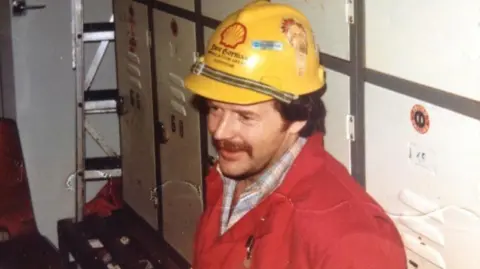 Shane Gorman
Shane Gorman
David Gorman was 41 when he died on Piper Alpha
Shane Gorman was 18 when he lost his dad in the Piper Alpha disaster.
David was a safety officer on the oil platform, which stood about 120 miles (193km) north-east of Aberdeen.
He was one of 167 men who died after a gas explosion tore the facility to pieces in July 1988, in what remains the world's worst offshore oil and gas accident.
The trauma of that loss has shaped Shane's life, inspiring him to follow David in trying to make the industry safer for those who work in it.
In a new BBC Scotland series telling the story of the disaster and its aftermath, Shane - who had joined the Army shortly before the explosion - explains why he later decided to pursue a career offshore.
"I just felt that this is what I need to do," he says. "It was right for me. I went as a safety officer, which is what my dad used to do. He was always talking about keeping people safe. That was his calling.
"I'd always wanted to figure out what this was, this thing that took my dad away from me. What is it? What contributed to it being such an enormous disaster?
"As it turns out, it's a catalogue of things that have to line up. Just the perfect storm."
The last photo of David and Shane was taken just five days before the disaster. It shows father and son, arms around one another, enjoying a drink and marking a special occasion.
"It was a kind of farewell party or a good luck party for me going down to the army," Shane says.
"I was 18-and-a-half and he was 41 then."
They said goodbye for the final time at a railway station, before Shane set off to begin basic training.
"My dad and my mum took me up to Edinburgh Waverley and my dad shook my hand," he says. "I remember him shaking my hand and saying 'go to it'."

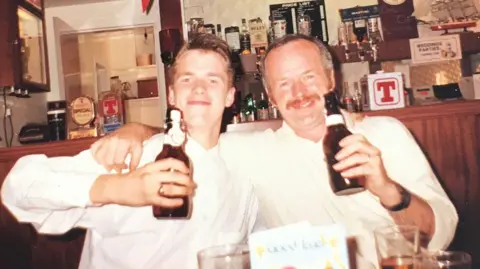 Shane Gorman
Shane Gorman
David Gorman (right) toasted his son Shane's departure to join the army just five days before dying in the Piper Alpha disaster
Within days, everything changed.
While he was going through his basic training, Shane did not get access to newspapers or watch TV.
He says: "You're in the army. It was my lieutenant, my commanding officer, who came in and said: 'You have to go home. Now.'
"They gave me a train warrant and took me to Darlington train station in a Land Rover and just dropped me off.
"Of course, I'm still none the wiser to what's going on. And I'm really confused about why I'm being sent home."
That was when Shane learned what had happened to Piper Alpha, the platform his dad had been working on.
"I went into the newsagent to buy a can of Coke and a Mars bar or something and the papers were just covered," he says. "Metal sticking out of the sea, headlines. Reporting of the amount of people that had died.
"And honestly, I just knew right then that he was dead and wasn't coming back. I just knew it straight away.
"I just wept the whole way up on the train. And I'm 18 years old and I was comforted by two old ladies.
"I don't even think I managed to tell them why I was so upset. Maybe I did, I don't remember. It was kind of blank from there on in."

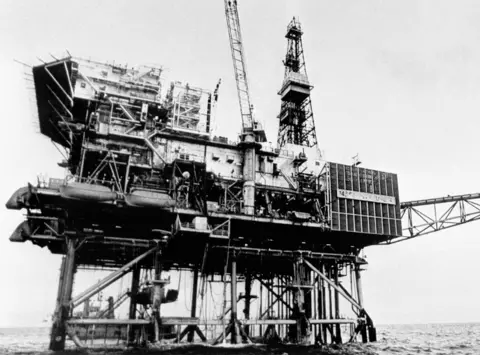 PA Media
PA Media
Piper Alpha had been operating in the North Sea since 1975
The Piper oilfield lies about halfway between Scotland the west coast of Norway. It was discovered in 1973 and production started in December 1976.
Piper Alpha was installed over the field in 1975. A fixed platform, it was attached by permanent legs to the seabed 472ft (144m) below the surface of the North Sea.
Designed to simultaneously drill and produce oil, it was operated by the UK arm of Occidental Petroleum, a US company with interests across the globe.
It was modified to produce gas as well as oil and, at its peak, the platform is said to have accounted for about 10% of the oil production of the entire North Sea.
That all ended on the night of 6 July 1988.
What happened to Piper Alpha?
The events which led to the explosion began with a leak from pipes connected to a pump. A safety valve had been removed from the pipes for maintenance.
A communications failure on the platform meant work was being done at the same time on the pump itself. When the pipe work from which the safety valve had been removed was pressurised at start-up, gas began leaking.
Soon after, the gas ignited, causing an explosion which set off the oil. The heat ruptured a gas pipeline from another installation, producing a fireball that engulfed Piper Alpha.
Fire spread and the effects were devastating. Explosions ripped through firewalls and engulfed much of the platform, including the control room and accommodation blocks - which were meant to be fireproof and safe.
Less than two hours after the initial explosion the platform, its supporting structure weakened by the intense fires, began to buckle and collapse.
First cranes, then the drilling derrick and finally the accommodation modules fell into the sea. They were filled with workers who had sought sanctuary from the inferno.
Of the 226 men on board, 165 died, along with two rescuers.
The 61 who survived had managed to make it off the platform and into the sea, where they were picked up by a small flotilla of vessels.
Of these men, five had jumped 175ft (53m) from the helicopter deck.
Burning oil created thick black smoke in the aftermath of the explosions
165 out of 226 crew died on Piper Alpha along with two rescuers
Those who had made it off Piper Alpha were taken to hospital in Aberdeen, but it took months to account for the casualties.
David Gorman was among those whose bodies were missing.
Shane says: "The information that we had was my dad was missing, presumed dead. Weirdly, the last time my dad was seen he was holding a door open for people to get through in the accommodation."
The accommodation blocks were raised from the seabed towards the end of 1988. David's body was not among the 87 found inside.
"My dad was one of the ones that was never found," Shane says.
"There was an acceptance that we wouldn't find his body, which takes its toll as well because it's… not just to get a death certificate, it's not really about that... it's just the fact that there's no closure."
David was one of 30 Piper Alpha victims whose remains were never recovered.
What was left of the platform was toppled into the sea in March 1989.
What went wrong on Piper Alpha?
The official inquiry, chaired by the Scottish judge Lord William Cullen, opened in November 1988 in Aberdeen.
The BBC series recreates the often harrowing testimony of survivors, rescuers and experts as they pieced together the events of the night and the aftermath.
The inquiry sat for 180 days over 13 months. Lord Cullen's final report, published in November 1990, was scathing about Occidental's management of the platform, its communication systems, attitude towards the safety of workers, and the overall industry and government oversight of conditions in the North Sea.
Nearly four decades on, and with the benefit of 13 years working offshore, Shane remains appalled by what he learned about the circumstances of his father's death.
"I don't think on that night they had any plausible or practical way to fight a fire like that. You cannot fight a fire like that. You have to turn off its fuel and that didn't happen," he says.
"They didn't have authority from management to stop pumping even if they could blatantly see that there was a massive disaster happening in front of their eyes. It appears that there was a fear that if they had shut down, they would lose their jobs."

 BBC Studios Productions/Tom Hayward
BBC Studios Productions/Tom Hayward
Shane Gorman, now 55, works as a safety consultant in the North Sea oil and gas industry
Shane is especially angered by the lack of public announcements to evacuate the platform, a failure which was catastrophic for the workers that night.
"That just never came. Most people just had to fend for themselves and try and find their own way off the platform," he says.
"I honestly thought that it was an absolute disgrace. Cullen's report discovered a systemic failure, cultural failure, a kind of flippancy towards safety led from the top down.
"How it was allowed to happen? I'm not sure. But it was."
The memorial to the Piper Alpha disaster stands in Aberdeen's Hazlehead Park. It depicts three offshore workers and carries the names and ages of the 167 dead.
What happened that night in July 1988 changed the UK oil and gas industry forever.
Lord Cullen made 106 recommendations covering the way the industry and government operated the sector. A protracted period of industrial unrest and protest from workers helped press for change.
In the 37 years since, there have been no major safety emergencies in the North Sea.

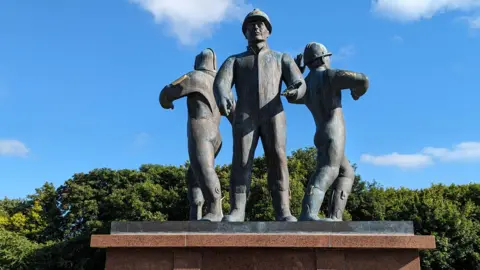 Alamy
Alamy
The Piper Alpha memorial stands in Aberdeen's Hazelhead Park
Occidental is said to have paid survivors and the families of the dead $220m in compensation. The insurance claims for the damage came to about $1.4bn.
In May 1991, Occidental sold its UK oil and gas business to the French company Elf for $1.35bn.
Two months later, Scotland's most senior law officer, Lord Advocate Peter Fraser, said there was insufficient evidence to establish the cause of the disaster or any criminal liability.
He announced no criminal charges would be pursued against any individual or the platform's operators.
Shane Gorman continues to work as a safety consultant in the North Sea oil and gas industry, carrying on the work his dad died doing.
He says: "Piper Alpha ought to be a lesson to us all not to be complacent and not allow greed and money to rule over people and safety.
"I think that that's the message. People are more important."
.png)
 3 months ago
15
3 months ago
15


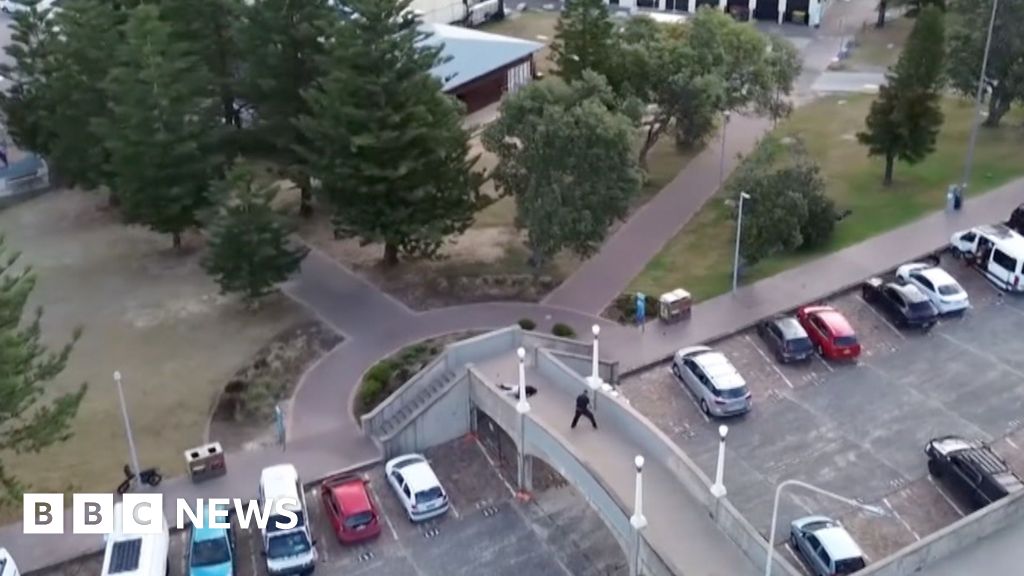





 English (US) ·
English (US) ·